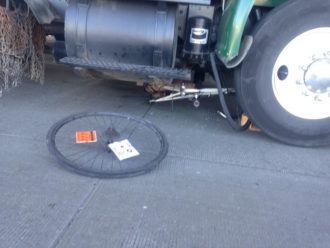Juries in two separate cases that concluded in recent weeks awarded large sums to people injured while biking in Seattle.
Thyce Colyn, 51, was awarded $38 million after a jury found Standard Parking fully liable for a 2012 collision near the downtown Grand Hyatt Hotel that left him severely injured.
The jury found that valets systematically made dangerous mid-block crossings of 8th Ave in order to save time parking and retrieving cars for hotel guests, and the company did nothing to discourage this behavior. That shortcut was responsible for the collision, so the company is liable.
More details from the Seattle Times:
Valets in Seattle shuttled cars belonging to visitors at the Grand Hyatt Hotel to the garage at the nearby Olive 8 residential tower, where more room was available, [Colyn’s attorney David] Beninger said. They drove from the Olive 8 across Eighth Avenue into a surface parking lot, and used alleys, instead of making a longer trip on streets and four intersections, according to plaintiff’s court documents.
“This kind of stuff was going on the entire time they were having the valets,” Beninger said Thursday night.
Colyn was riding north, in the right lane, at 4 p.m. on Oct. 8, 2012, from his job in Sodo to home in Ravenna. The lane was marked by “sharrows” — white bicycle-shaped icons — designed to alert people to expect bikes.
The valet, 21, was bringing a car from the Olive 8 across the northbound one-way street, perpendicular to traffic, and didn’t see the cyclist, to his right, according to court documents. He was cited for failure to yield the right of way.
The shortcut saved time, when hotel customers wanted their cars, Beninger said.

In a separate case, a jury found Seattle 58 percent at fault in a 2014 collision under the Spokane Street Viaduct, awarding Gabriel Quintanilla a total of $2.7 million with the city on the hook for $1.6 million.
The collision occurred mostly due to poor sight lines caused by pillars from the city’s Spokane viaduct widening project that wrapped up in 2012, the jury found. The driver of the truck and Quintanilla were each found 21 percent at fault.
More details from the Times:
In the Spokane Street case, city traffic engineer Dongho Chang, an avid bicyclist and safety advocate, acknowledged in a deposition that the city didn’t perform detailed studies of sight lines in the crosswalk before the $164 million Spokane viaduct project opened in 2012. (The project was designed years before Chang joined the city.)
A different crosswalk layout could have solved the problem, [Quintanilla’s attorney Tony] Russo said.
Chang said Monday, “We are going to be reviewing our options for what we need to do at that intersection, or others.”
Quintanilla, who suffered hip and leg injuries, can walk but was traumatized by being dragged by the truck, and his injuries will probably thwart a goal he had to become a bike messenger, his attorney said.








Comments
6 responses to “Juries side with two people severely injured while biking in Seattle”
Google Maps says that it is a three-minute walk from the Grand Hyatt to the Olive 8.
Trying to wrap my head around how valets could possibly retrieve cars faster than people could walk their themselves. Free idea for the Grand Hyatt: if your patrons need help with their luggage, offer attendants and luggage racks to accompany them on the walk to their cars and vice versa. Lower risk and just as fast — if not faster.
For guests who have a hard time walking, preserve the valet option and slow the f down.
It wouldn’t be particularly easy to find your car if the person who parked it was the valet.
If you call for your car at the same time you call for a bellhop, your car should be waiting in the drive when the elevator doors open, so the bellhop can load your bags for you without having to wait around. There’s plenty of time for that if you’re actually checking out with bags. (The people who are in a hurry are late for dinner, a meeting, or a show, and they don’t have bags, they have attitude.)
But for the valet drivers, tips are limited by the number of cars they can retrieve in a shift as well as how quickly they get them. Doubling the time it takes to retrieve a car cuts the maximum number of tips in half. The incentive for valets to cut corners will always be there as long as tipping is such a big part of their income, that’s why it’s important for the employer to have an active safety program that monitors and corrects reckless behavior.
“Guests that have a hard time walking”. 95% of americans,right?
I am glad to see people getting settlement money, but $38 million is overkill by an order of magnitude. Settlement money should be enough to cover all medical expenses, living expenses if injuries preclude work, a reasonable amount of pain and suffering and also serve as a stern warning to companies that put profits over people. Essentially, Thyce Colyn should be set for life. I could see $10 million being a very reasonable settlement, but $38 million?
Granted, the $38 million will likely be drastically reduced by settlement and appeals and at least 2/3 of what is left will go to the lawyers.
But how large of a penalty does it take to “send a stern warning” to a corporation that size?
$38 million is less than three months’ gross profit for Standard Parking.
If you were grossing $120,000/year, would a $30,000 penalty really be out of line for an ongoing pattern of dangerous behavior that led to crippling someone for life?